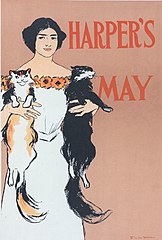
Harper's Magazine
Harper's Magazine is a monthly magazine of literature, politics, culture, finance, and the arts. Launched in New York City in June 1850, it is the oldest continuously published monthly magazine in the United States.[a] Harper's Magazine has won 22 National Magazine Awards.[1]
Not to be confused with Harper's Weekly, Harper's Bazaar, or Harpers Wine & Spirit.Editor
Monthly
104,882
June 1850 (as Harper's New Monthly Magazine)
New York City
Harper's Magazine Foundation
666 Broadway, New York City, New York, U.S.
English
Throughout the 19th and 20th centuries, the magazine published works of prominent authors and political figures, including Herman Melville, Woodrow Wilson, and Winston Churchill. Willie Morris's resignation as editor in 1971 was considered a major event, and many other employees of the magazine resigned with him. The magazine has developed into the 21st century, adding several blogs.
Controversies[edit]
Editor Lewis H. Lapham was criticized for his reportage of the 2004 Republican National Convention, which had yet to occur, in his essay "Tentacles of Rage: The Republican Propaganda Mill, a Brief History", published in the September 2004 issue, which implied that he had attended the convention. He apologized in a note.[13][14] Lapham left two years later, after 28 years as Harper's editor-in-chief, and launched Lapham's Quarterly.
The August 2004 issue contained a photo essay by noted photojournalist Peter Turnley, who was hired to do a series of photo essays for the magazine. The eight-page spread in August 2004 showed images of death, grieving, and funerals from both sides of the war in Afghanistan. On the U.S. side, Turnley visited the funeral of an Oklahoma National Guard member, Spc. Kyle Brinlee, 21, who was killed when his vehicle ran over an improvised explosive device (IED) in Afghanistan. During his funeral, Turnley photographed the open casket as it lay in the back of the high school auditorium where the funeral was held to accommodate 1,200 mourners, and the photo was used in the photo essay. Brinlee's family subsequently sued the magazine in federal court. The case ended in 2007 when the U.S. Supreme Court ruled that the unauthorized publication was in "poor taste" but upheld the ruling of the Tenth Circuit that the magazine had not violated the privacy rights of the family, since the family had invited the press and, according the court, "opened up the funeral scene to the public eye".[15]
The March 2006 issue included an article by Celia Farber, "Out of Control: AIDS and the Corruption of Medical Science", presenting Peter Duesberg's theory that HIV does not cause AIDS.[16][17] It was strongly criticized by AIDS activists,[18] scientists and physicians,[19] the Columbia Journalism Review,[20] and others as inaccurate and promoting a scientifically discredited theory.[21] The Treatment Action Campaign, a South African organization working for greater popular access to HIV treatments, posted a response by eight researchers documenting more than 50 errors in the article.[22]
In 2006, Lapham was succeeded as Harper's editor by Roger Hodge.[23] Since that time, the magazine has had a number of shorter-termed editors in chief, several of whom were fired amid various controversies.[23] On January 25, 2010, the firing of the magazine's editor, Roger Hodge, by publisher John R. MacArthur was met with criticism among the magazine's subscribers and staff.[24][25][26] MacArthur initially claimed Hodge was stepping down for "personal reasons", but later disclosed that he fired Hodge.[27]
Ellen Rosenbush served as editor from 2010 to 2015. She returned in January 2016 when MacArthur fired Christopher Cox, who had been named editor only three months prior in October 2015.[23][28]
James Marcus assumed the post of editor in 2016.[23] In March 2018, an essay by Katie Roiphe on the #MeToo movement excited controversy both online and inside Harper's. Marcus had complained about the piece, suggesting the critique of #MeToo was inappropriate in light of Harper's "longtime reputation as a gentleman's smoking club"; he attributed this disagreement as a primary cause of his firing in 2018.[23] In April 2018, Ellen Rosenbush assumed the title of editorial director. In October 2019, the magazine announced that novelist and essayist Christopher Beha would be taking over as editor, with Rosenbush remaining as editor-at-large.[29]
In July 2020, Harper's published an open letter called "A Letter on Justice and Open Debate" criticizing "illiberalism" and promoting a tolerance of different viewpoints. The letter received a mixed response on Twitter with some remarking that the prominent signatories had "bigger platforms and more resources than most other humans" and were unlikely to face repercussions for anything they said, and others taking umbrage at particular signatories such as J. K. Rowling, who faced recent criticism for her comments on transgender issues.[30][31]




